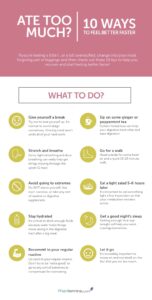Ate too much? 10 Ways to Feel Better Faster
We’re all human. No matter how diligent you are about weight loss, healthy eating, and balanced living in your daily life, chances are there will come a day when you indulge a little (or a lot) more than planned.
Good news: it’s completely normal to overdo it occasionally! Bad news: that doesn’t mean it feels any better at the moment when you realize you ate too much.
So what can you do in the hours and days after a feast or binge to help your body recover? Here are 10 tips to help you feel better and get back on track faster!
What Happens When You Overeat
Our bodies need fuel, so there are whole systems of hormones and bodily processes that spring into action to indicate when we’re hungry, satiated, or overly full.
For that reason, there are very predictable biological reactions when you eat too little or too much.
The first and most noticeable result of overindulging is that your stomach swells to accommodate the extra food and drink.
This causes pain as it pushes on the other organs and reminds you that you’re too full. If you swallowed a lot of air while chewing and/or drank soda during the meal, air can also get into your stomach and cause a gassy, bloated feeling.
In response to this excessive fullness, your stomach produces additional stomach acid to help digest the mass of food. This extra-acidic environment can contribute to heartburn when your stomach is incredibly full.
Your hormones also go into overdrive to help digest the large meal. Insulin, for example, is released to modulate blood sugar, which triggers the release of feel-good hormones that make you feel happy and a little sleepy.
This explains why you often feel the urge to take a nap after a big meal.
This all happens within the first couple of hours of overeating. For many hours afterward, your organs continue working to digest the food, and levels of select hormones remain elevated to direct the use and storage of the extra calories.
What to Do If You Overeat

The food tasted great a few minutes ago, but now all you can think is, “I ate too much. I ate too much. I ate too much.”
If you’re feeling a little (…or a lot) overstuffed, change into your most forgiving pair of leggings, and then check out these 10 tips to help you recover and start feeling better faster!
1. Give yourself a break
First and foremost, try not to beat yourself up. It’s normal to overindulge sometimes, and as long as you don’t make a regular habit of it, it’s really no big deal in the long run.
Wallowing in feelings of guilt, sadness, remorse, or anxiety will only prolong the destructive binge-restrict cycle.
Instead of beating yourself up, try to see the current situation as a learning experience. Would you have been just as happy with one plate instead of three?
Was there a trigger that caused you to overeat? If you came to the table overly hungry because you skipped lunch, felt pressured to eat, or noticed you were emotionally eating, is that something you could prevent in the future?
Consider small changes you could make to minimize these triggers at upcoming meals.
Feeling bad about the meal you already ate won’t do you any good. However, if you can think positively about how to minimize overeating in the future, it may help you build a healthier relationship with food and – hopefully – avoid this discomfort down the road!
2. Sip on some ginger or peppermint tea
Certain herbal teas can help your digestive track relax and ease digestion.
Ginger is an age-old remedy for stomach discomfort and a standard, natural treatment for nausea. Since overeating and the subsequent over-production of leptin can make you nauseous, sipping ginger tea can provide great comfort.
Likewise, peppermint tea is touted for its ability to relieve gas, stomach pains, and indigestion (heartburn). Sip on a cup of warm, mint tea to help relieve these common symptoms of overeating.
3. Stretch and breathe
Some light stretching and deep breathing can really help get things moving through the upper GI tract and help alleviate that uncomfortable, “I ate too much” feeling.
Breathe deeply to relax and increase oxygen levels. Many people get stressed and breathe shallowly after eating too much, but digestion is actually most effective when you’re relaxed and oxygenated.
So, give your digestive tract muscles the power they need to work through the big meal by taking some deep, soothing breaths.
Then, if you’re feeling up to it, try some gentle stretches or yoga poses (e.g., child’s pose, cobra, or happy baby) to promote digestion.
Moving around gently can also help release trapped gas – a significant contributor to the discomfort of being overly full. Just make sure to avoid any inversions (upside-down positions) since those could worsen acid reflux/heartburn after a big meal.
4. Go for a walk
The most common tip for recovering from a big meal is to take a pleasant, leisurely stroll.
If you overate and feel like you need to help your body out a little bit with digestion, head outside for some fresh air and a quick 15-20 minute walk. Similar to yoga, walking gently massages your organs and increases circulation to promote digestion.
Avoid any strenuous activity in the hours following a big meal. Even though you may be tempted to work off your big meal with an equally big workout, it’s best to take it easy (at least for a few hours).
Enjoy a short walk or easy hike with your family, friends, or pet today, and then tomorrow, you can get back to your regular exercise routine.
5. Avoid going to extremes
On that note, avoid going to any sort of extremes to “make up” for the fact that you ate too much earlier.
Do NOT starve yourself, fast, over-exercise, or take any sort of laxative or digestive supplement. They’re all risky, and none of these behaviors proves beneficial in the long run.
Engaging in these unhealthy compensatory behaviors makes you more likely to fall into (or continue) a detrimental binge-purge cycle. Plus, your ultimate goal is sustainable weight loss and a healthy relationship with food, so avoid going to any sort of extremes that make that final goal harder to achieve.
Instead, aim to recommit your healthy eating and exercise habits as soon as possible.
This is the best way to keep the occasional overeating episode from becoming a regular habit. Here are some specific steps to start with:
6. Eat a light salad 5-6 hours later
When you initially realize that you ate too much, it may feel like you never want to eat again. Still, it’s important to eat something light a few hours later to keep your metabolism active.
When we go too long without eating, our metabolism slows to conserve energy.
This was a hugely helpful adaption when we were hunter-gatherers that went days at a time without a substantial meal, but in our modern world, it’s more often a barrier to desirable weight loss.
So, if you feel hungry, have a small meal that’s relatively low in calories and carbs, and moderate in protein, 5-6 hours after your too-big meal.
For example, if you had a huge breakfast or lunch, grab a light salad for dinner.
Steer clear of cheese, creamy dressings, processed meats, and croutons that will only make you feel fuller. Instead, fill your plate with lots of nutrient-rich greens and top them with fruits & veggies, grilled chicken, and/or a light vinaigrette.
7. Stay hydrated

Hydration is always important, especially when you’re taking phentermine.
After a big meal, it’s especially critical to drink enough fluids because water helps things move along in the digestive tract after a big meal. Choose plain or infused water (e.g., water with lemon) to avoid drinking unnecessary calories or added sugars.
8. Get a good night’s sleep
Sleep is wonderfully restorative, and getting enough shut-eye tonight will help you resist cravings tomorrow.
If you binge on high-carbohydrate, high-sugar foods (as most of us do), it’s common to experience a spike in blood sugar and a subsequent crash.
Variations in blood sugar can worsen cravings, as can lack of sleep. Skimming sleep skews hormone levels and makes you susceptible to cravings and further overeating. So, set yourself up for success by getting at least 7 hours of sleep tonight!
9. Recommit to your regular routine
When you wake up tomorrow, go back to your regular routine. Don’t try to be “extra good” or go to any sort of extremes to compensate for overeating.
Eat your typical meals, do your favorite workout and continue to manage stress when possible.
10. Let it go
As hard as it may be, it’s incredibly important to move on and not dwell on the fact that you ate too much – even if you’re working hard to lose weight.
If you can successfully recommit to healthy eating and exercise habits quickly, one “cheat meal” or overindulgent day every few months is no big deal in the long run.
That being said, if seeing the scale budge will upset you, avoid weighing yourself for 2-3 days after you overate.
If your meal was less-than-healthy, chances are you’ll retain water, and the scale will show a bump in your weight. Instead of running to the scale, go back to your regular routine and check in a few days if you’d like.
What do you do when you realize you ate too much? Share your tips and experiences with us in the comments section below!
Did you like the article?
Subscribe to our weekly newsletter and get our best weight loss tips straight to your inbox!









